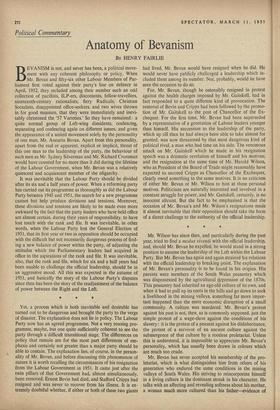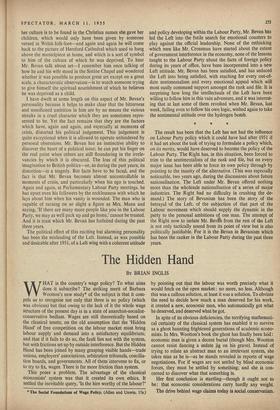Political Commentary
Anatomy of Bevanism
By HENRY FAIRLIE BEVANISM is not, and never has been, a political move- ment with any coherent philosophy or policy. When Mr. Bevan and fifty-six other Labour Members of Par- liament first voted against their party's line on defence in April, 1952, they included among their number such an odd collection of pacifists, ILP-ers, discontents, fellow-travellers, nineteenth-century rationalists, fiery Radicals, Christian Socialists, disappointed office-seekers, and two wives thrown in for good measure, that they were immediately and inevi- tably christened the '57 Varieties.' So they have remained : a quite normal group of Left-wing dissidents, coalescing, separating and coalescing again on different issues; and given the appearance of a united movement solely by the personality of one man, Mr. Aneurin Bevan. Apart from this personality, apart from the real or apparent, explicit or implicit, threat of this one man to the leadership of the party, the behaviour of such men as Mr. Sydney Silverman and Mr. Richard Crossman would have counted for no more than it did during the lifetime of the Labour Government. when Mr. Bevan was a relatively quiescent and acquiescent member of the oligarchy.
It was inevitable that the Labour Party should be divided after its six and a half years of power. When a reforming party has carried out its programme as thoroughly as did the Labour Party between 1945 and 1951, the search for a new programme cannot but help produce divisions and tensions. Moreover, these divisions and tensions are likely to be made even more awkward by the fact that the party leaders who have held office are almost certain, during their years of responsibility, to have lost touch with the rank and file. It was inevitable, in other words, when the Labour Party lost the General Election of 1951, that its first year or two in opposition should be occupied with the difficult but not necessarily dangerous process of find- ing a new balance of power within the party. of adjusting the attitudes which the Parliamentary leaders had acquired in office to the aspirations of the rank and file. It was inevitable, also, that the rank and file, which for six and a half years had been unable to challenge the official leadership, should be in an aggressive mood. All this was expected in the autumn of 1951, and basically the story of the Labour Party's disputes since then has been the story of the readjustment of the balance of power between the Right and the Left.
Yet, a process which is both inevitable and desirable has turned out to be dangerous and brought the party to the verge of disaster. The explanation does not lie in policy. The Labour Party now has an agreed programme. Not a very rousing pro- gramme, maybe, but one quite sufficiently coherent to see the party through a difficult transitional stage. The differences on policy that remain are for the most part differences of em- phasis and certainly not greater than a major party should be able to contain. The explanation lies, of course, in the person- ality of Mr. Bevan, and before discussing this phenomenon of nature it is worth recalling the circumstances of his resignation from the Labour Government in 1951. It came just after the twin pillars of that Government had, almost simultaneously, been removed. Ernest Bevin had died, and Stafford Cripps had resigned and was never to recover from his illness. It is ex- tremely doubtful whether, if either or both of these two giants had lived, Mr. Bevan would have resigned when he did. He would never have publicly challenged a leadership which in- cluded them among its number. Nor, probably, would he have seen the occasion to do so.
For, Mr. Bevan, though he ostensibly resigned in protest against the health charges imposed by Mr. Gaitskell, had in fact responded to a quite different kind of provocation. The removal of Bevin and Cripps had been followed by the promo- tion of Mr. Gaitskell to the post of Chancellor of the Ex- chequer. For the first time, Mr. Bevan had been superseded by a representative of a generation of Labour leaders younger than himself. His succession to the leadership of the party, which up till then he had always been able to take almost for granted, was now threatened by that most dangerous kind of political rival, a man who had time on his side. The venomous attack on Mr. Gaitskell which he made in his resignation speech was a dramatic revelation of himself and his motives; and the resignation at the same time of Mr. Harold Wilson, who as President of the Board of Trade might reasonably have expected to succeed Cripps as Chancellor of the Exchequer, clearly owed something to the same motives. It is no criticism of either Mr. Bevan or Mr. Wilson to hint at these personal motives. Politicians are naturally interested and involved in a constant struggle for power, and Mr. Gaitskell, certainly, is no innocent altruist. But the fact to be emphasised is that the occasion of Mr. Bevan's and Mr. Wilson's resignations made it almost inevitable that their opposition should take the form of a direct challenge to the authority of the official leadership.
Mr. Wilson has since then, and particularly during the past year, tried to find a modus vivendi with the official leadership, and, should Mr. Bevan be expelled, he would stand in a strong position to assume the leadership of the Left within the Labour Party. But Mr. Bevan has again and again strained his relations with the official leadership to breaking point. The explanation of Mr. Bevan's personality is to be found in his origins. His parents were members of the South Wales peasantry which was dispossessed by the agricultural depression of the 1870s. This peasantry had inherited an age-old culture of its own, and when it had to pull up its roots in the hills and go down to seek a livelihood in the mining valleys, something far more impor- tant happened than the mere economic disruption of a small community. A culture was murdered. Mr. Bevan's protest against his past is not, then, as is commonly supposed, just the simple protest of a wage-slave against the conditions of his slavery : it is the protest of a peasant against his disinheritance, the protest of a survivor of an ancient culture against the submergence of that culture by a rootless proletariat. Unless this is understood, it is impossible to appreciate Mr. Bevan's personality, which has usually been drawn in colours which are much too crude.
Mr. Bevan has never accepted his membership of the pro- letariat, which is what distinguishes him from others of his generation who endured the same conditions in the mining valleys of South Wales. His striving to reincorporate himself in a living culture is the dominant streak in his character. He talks with an affecting and revealing softness about his mother, a woman much more cultured than his father—evidence of her culture is to be found in the Christian names she gave her children, which would only have been given by someone versed in Welsh folk-lore--and again and again he will come back to the picture of Hereford Cathedral which used to hang above the mantelpiece at home, and which is a sort of symbol to him of the culture of which he was deprived. To hear Mr. Bevan talk about art—I remember him once talking of how he and his wife stood in the Sistine Chapel and wondered whether it was possible to produce great art except on a great scale, a characteristic observation—is to watch someone trying to give himself the spiritual nourishment of which he believes he was deprived as a child.
I have dwelt at some length on this aspect of Mr. Bevan's personality because it helps to make clear that the bitterness and unsoftened ambition in him are by no means the vicious streaks in a cruel character which they are sometimes repre- sented to be. Yet the fact remains that they are the factors which have, again and again, and especially at moments of crisis, distorted his political judgement. This judgement is quite exceptional when it is allowed to operate unhindered by personal obsessions. Mr. Bevan has an instinctive ability to discover the heart of a political issue; he can put his finger on the real point when others are still floundering in the irrele- vancies by which it is obscured. The loss of this political imagination to British politics—or, as during the past years, its distortion—is a tragedy. But facts have to be faced, and the fact is that Mr. Bevan becomes almost uncontrollable in moments of crisis, and particularly when his ego is touched. Again and again, at Parliamentary Labour Party meetings, he has upset even his followers by the recklessness with which he lays about him when his vanity is wounded. The man who is capable of turning on so slight a figure as Mrs. Mann and saying, 'If there are many more people like you in the Labour Party, we may as well pack up and go home,' cannot be trusted. And it is trust which Mr. Bevan has forfeited during the past three years.
The political effect of this exciting but alarming personality has been the misleading of the Left. Instead, as was possible and desirable after 1951, of a Left wing with a coherent attitude and policy developing within the Labour Party, Mr. Bevan has led the Left into the futile search for emotional counters to play against the official leadership. None of the rethinking which men like Mr. Crossman have started about the extent of government interference in the economy, none of the lessons taught to the Labour Party about the facts of foreign policy during its years of office, have been incorporated into a new Left attitude. Mr. Bevan has been satisfied, and has seduced the Left into being satisfied, with reaching for every out-of- date sentimentalism and every emotional appeal which will most easily command support amongst the rank and file. It is surprising how long the intellectuals of the Left have been willing to follow him in this vain adventure, and it was interest- ing that at last some of them revolted when Mr. Bevan, last week, failing even to follow his own logic, wished again to take the sentimental attitude over the hydrogen bomb.
The result has been that the Left has not had the influence on Labour Party policy which it could have had after 1951 if it had set about the task of trying to formulate a policy which, on its merits, would have deserved to become the policy of the Labour Party. The Right has, in this situation, been forced to trim to the sentimentalists of the rank and file, but on every major issue has been able to force its own policy through by pointing to the inanity of the alternative. (This was especially noticeable, two years ago, during the discussions about future nationalisation. The Left under Mr. Bevan offered nothing more than the wholesale nationalisation of a series of major industries. The Right had no difficulty in crushing the de- mand.) The story of Bevanism has been the story of the betrayal of the Left: of the subjection of that part of the Labour movement which should supply the dynamic in the party to the personal ambitions of one man. The attempt of the Right now to isolate Mr. Bevtn from the rest of the Left is not only tactically sound from its point of view but is also politically justifiable. For it is the Bevan in Bevanism which has been the canker in the Labour Party during the past three years.











































 Previous page
Previous page